Brakes
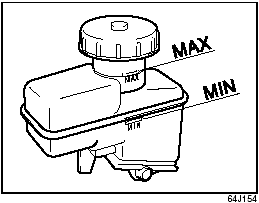
Brake Fluid
Check the brake fluid level by looking at the reservoir in the engine compartment.
Check that the fluid level is between the “MAX” and “MIN” lines. If the brake fluid level is near the “MIN” line, fill it up to the “MAX” line with DOT3 brake fluid.
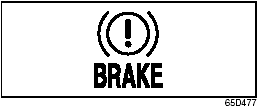
 WARNING:
WARNING:
Failure to follow the guidelines below
can result in personal injury or serious
damage to the brake system.
• If the brake fluid in the reservoir
drops below a certain level, the
brake warning light on the instrument
panel will come on (the
engine must be running with the
parking brake fully disengaged.)
Should the light come on, immediately
ask your SUZUKI dealer to
inspect the brake system.
• A rapid fluid loss indicates a leak in the brake system which should be inspected by your SUZUKI dealer immediately.
• Brake fluid can harm your eyes and damage painted surfaces. Use caution when refilling the reservoir.
• Do not use any fluid other than DOT3 brake fluid. Do not use reclaimed fluid or fluid that has been stored in old or open containers.
It is essential that foreign particles and other liquids are kept out of the brake fluid reservoir.
 WARNING:
WARNING:
Brake fluid is harmful or fatal if swallowed,
and harmful if it comes in contact
with skin or eyes. If swallowed,
do not induce vomiting. Immediately
contact a poison control center or a
physician. If brake fluid gets in eyes,
flush eyes with water and seek medical
attention. Wash thoroughly after
handling. Solution can be poisonous
to animals. Keep out of the reach of
children and animals.
CAUTION:
The brake fluid should be replaced
according to the maintenance schedule.
Have the brake fluid replaced by your SUZUKI dealer.
NOTE:
With disc brakes, the fluid level can be
expected to gradually fall as the brake
pads wear.
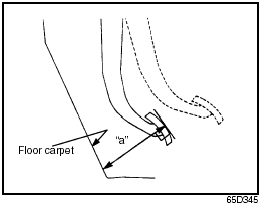
Brake Pedal

With the engine running and the parking brake set, measure the distance between the brake pedal and floor carpet when the pedal is depressed with approximately 300 N (66 lbs, 30 kg) of force. The minimum distance required is as specified. Since your vehicle’s brake system is self-adjusting, there is no need for pedal adjustment.
If the pedal to floor carpet distance as measured above is less than the minimum distance required, have your vehicle inspected by your SUZUKI dealer.
NOTE:
When measuring the distance between the
brake pedal and floor wall, push in the floor
carpet as far as it goes and measure the
distance between the carpet surface and
the brake pedal.
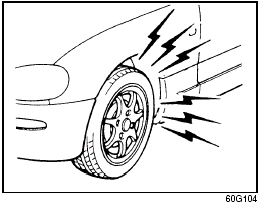
 WARNING:
WARNING:
If you experience any of the following
problems with your vehicle’s brake
system, have the vehicle inspected
immediately by your SUZUKI dealer.
• Poor braking performance.
• Uneven braking (Brakes not working uniformly on all wheels.).
• Excessive pedal travel.
• Brake dragging.
• Excessive noise.
• (Except ABS equipped vehicle).
Pedal pulsation (Pedal pulsates when pressed for braking.)
Parking Brake Lever
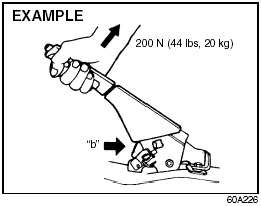
Parking Brake Lever

Check the parking brake for proper adjustment by counting the number of clicks made by the ratchet teeth as you slowly pull up on the parking brake lever to the point of full engagement. The parking brake lever should stop between the specified ratchet teeth and the rear wheels should be securely locked. If the parking brake is not properly adjusted or the brakes drag after the lever has been fully released, have the parking brake inspected and/or adjusted by your SUZUKI dealer.
See also:
Vehicle Loading and Towing
...
Seat Belts and Child Restraint Systems
WARNING:
An air bag supplements, or adds to,
the frontal crash protection offered
by seat belts. The driver and all passengers
must be properly restrained
by wearing seat belts at all time ...
Ride & Handling
It's a good thing that the SX4 handles better than it looks. It's as nimble
as the pros in this class — we're talking the likes of a Lancer, Mazda3 or
Focus. The steering wheel requires a bit mo ...
